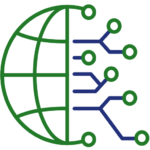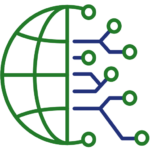Introduction
In industrial automation, three key technologies—PLC (Programmable Logic Controller), DCS (Distributed Control System), and SCADA (Supervisory Control and Data Acquisition)—play crucial roles in managing, controlling, and optimizing processes across manufacturing, energy, water treatment, and more.
While these systems have overlapping functions, they are designed for different scales, complexities, and types of control processes. This blog will break down what PLC, DCS, and SCADA are, how they work, and when to use each system.
What is a PLC?
Definition
A Programmable Logic Controller (PLC) is an industrial computer specifically designed to control machinery and processes. It continuously monitors inputs from sensors, executes logic based on pre-programmed instructions, and sends control signals to output devices like motors, valves, and actuators.
Key Features
- Real-time, high-speed control.
- Rugged design suitable for harsh environments.
- Flexible programming using ladder logic, function block, and structured text.
- Excellent for discrete automation processes (e.g., assembly lines, packaging machines).
Common Applications
- Machine control.
- Conveyor systems.
- Packaging equipment.
- Batch processes.
What is a DCS?
Definition
A Distributed Control System (DCS) is a centralized control system designed to manage large-scale, complex processes across an entire facility or plant. Unlike PLCs, which typically handle localized machine control, a DCS integrates multiple controllers into a cohesive system with centralized operator oversight.
Key Features
- Distributed architecture with multiple controllers.
- Highly reliable with redundancy options.
- Centralized human-machine interface (HMI) for operators.
- Suitable for continuous processes (e.g., chemical processing, oil refining, power generation).
Common Applications
- Power plants.
- Refineries.
- Chemical and pharmaceutical production.
- Water treatment facilities.
What is SCADA?
Definition
Supervisory Control and Data Acquisition (SCADA) is a software-based system that provides high-level monitoring and control across multiple systems and locations. SCADA systems aggregate data from PLCs, DCSs, and sensors, allowing operators to visualize process performance, analyze trends, and respond to alarms.
Key Features
- Real-time process visualization.
- Historical data collection and reporting.
- Alarm management and event logging.
- Remote monitoring and control.
- Scalable for multi-site applications.
Common Applications
- Utilities (electric, gas, water).
- Manufacturing plants.
- Transportation networks.
- Oil and gas pipelines.
PLC vs. DCS vs. SCADA: Key Differences
| Feature | PLC | DCS | SCADA |
|---|---|---|---|
| Primary Function | Machine-level control | Process control across entire facility | Supervisory monitoring & control across sites |
| System Type | Localized, discrete | Distributed, centralized | Centralized with remote data collection |
| Scalability | Limited to individual machines | Plant-wide coverage | Multi-site coverage |
| Operator Interface | Limited or none | Centralized operator stations | Centralized dashboards with remote access |
| Best For | Machine control, automation | Process industries, continuous operations | Real-time data collection and facility-wide oversight |
How They Work Together
In many facilities, PLCs, DCS, and SCADA systems work together to provide complete automation and monitoring capabilities:
- PLCs handle local machine control.
- DCS manages larger plant processes.
- SCADA collects and visualizes data from both PLC and DCS systems, providing operators with real-time visibility across all operations.
This layered approach ensures seamless automation, efficient process management, and high-level supervisory control, helping operators make data-driven decisions.
Conclusion
Understanding the roles of PLCs, DCS, and SCADA is critical for selecting the right automation and control strategy for your operation. Whether you’re controlling a single machine, managing plant-wide processes, or overseeing operations across multiple sites, these systems provide the foundation for efficient, reliable automation.
At IoTech Controls, we specialize in integrating PLCs, DCS, and SCADA systems to deliver smart, scalable automation solutions.
🌐 Website: https://iotechcontrols.com/
📞 Call Us: 864-824-4468
Ready to optimize your industrial control systems? Contact us today!



